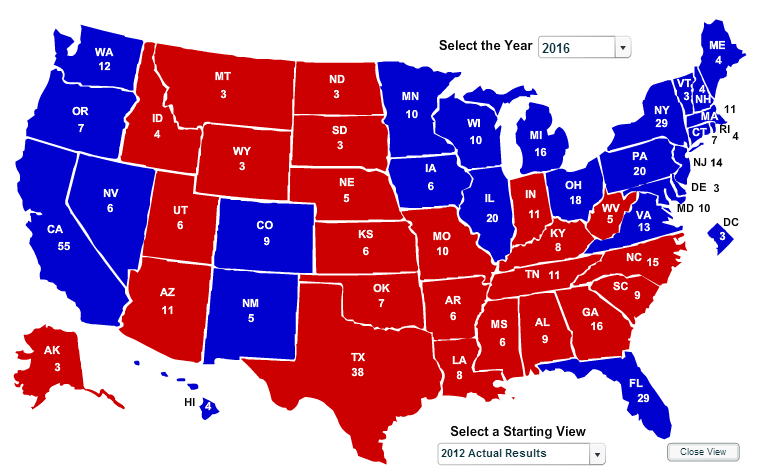The presidential elections of 2016 pose a range of questions to the citizens of the U.S. Since Barak Obama is already doing his second term, his reelection in 2016 does not seem a possibility according to the basic principles of the U.S. Constitution. As the fact that Rand Paul (the Republican Party) has pointed at the fact of him having more advantages than Hillary Clinton (the Democratic Party) in terms of age, competency and experience, the former is more likely to win due to a better reputation and rather deplorable effects of Democrats’ rule in 2014.

Table 1. Electoral College Map (American Research Group, Inc., 2014).
It should be born in mind that the factors determining the outcomes of the 2016 presidential elections are quite different from the ones that were the driving force behind the choices of the American people in 2012. First and most obvious, the issue concerning wages and jobs should be brought up. As long as pessimistic moods among the U.S. citizens concerning the specified issues persist, Hillary Clinton is highly unlikely to win the election, and her opponent may seem a much more favorable candidate for most of the voters. However, apart from the financial concerns, the economic issues, which the state is facing at the moment, need to be mentioned. The economic concerns are obvious, with the rapid decline of the stock market soaring and the employment issues becoming the key problem in the contemporary United States’ human resource market (Nyhan, 2014).
Finally, the foreign policy concerns have shaped people’s attitude towards the Democratic Party in General. With the emergence of ISIS and the following threat to the wellbeing of the entire world, people seem to have become quite uncertain about the efficacy of the Democratic Party’s actions. The voters are obviously upset with the outcomes of their choice, which is most likely to become the key driving force behind their decisions in the 2016 presidential elections.
The healthcare concerns are the last, but definitely not the least factor that deserves to be mentioned as the basic reason for people to choose the Republican Party over the Democratic one in the 2016 presidential elections. Not only the Medicare issue, but also the recent concerns about the Ebola virus seem to be affecting people’s opinion about the efficiency of Obama’s administration and the performance of the Democratic party in general. While one must admit that not all of the issues specified above could have been taken under Obama’s administration control, it is still obvious that the lack of stability and the increasing amount of threats that people have faced over the course of the current President’s administration have shaped their 2016 decision to a great degree. On a more general level of analysis, these are not the economic and political threats, but teh insecurity that the choices made by the democratic Party that have defined people’s attitude towards the 2016 candidates (Judis, 2014).
While Hillary Clinton has been stressing her advantages comparing his age and enthusiasm to considerably less impressive characteristics of Rand Paul, Mrs. Clinton seems to be unlikely to win the 2016 elections, as the effects of the Democratic Party’s rule have been beyond deplorable in Obama’s office years. Nevertheless, one must admit that both candidates have rather good chances for winning the elections, and making a strong statement concerning the choice of the American people is quite hard at present.
Reference List
American Research Group, Inc. (2014). Electoral vote calculator. Web.
Judis, J. B. (2014). The economy crushed the Democrats – and it will again in 2016 if they don’t shape up. New Republic. Web.
Nyhan, B. (2014). What 2014 elections can tell us about 2016: Not much at all. New York Ties. Web.